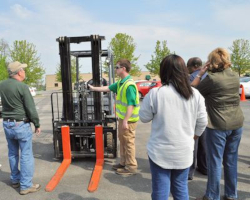Forklift Training
An untrained operator of a forklift can be as dangerous as an unlicensed operator of a motor vehicle.
As we mentioned earlier, it is a violation of Federal law for anyone under 18 years of age to operate a forklift or for anyone 18 years of age or older who is not properly trained and certified to do so.
The employer must ensure forklift operators are competent to operate the forklift they use. The employer must document operator training and evaluate the operator performance while using the forklift.
Training has three parts:
- formal instruction such as a lecture, discussion, interactive computer learning, videotape and/or written material (can be taken anywhere);
- hands-on practical training which includes demonstrations by the trainer and exercises by the trainee (on the model of forklift the worker will use); and
- an evaluation of the operator skills by observing the operator's performance while doing actual work using the forklift. This evaluation must be repeated at least once every three years (must be at workplace).
Refresher training may be required if the operator has been involved in an accident, near miss or unsafe operations. Also, if an operator is assigned to a new type of forklift or if workplace conditions change that could affect safety, then refresher training is required.
Forklift General Training Topics
The following is a list of general topics which should be covered when training a forklift operator. If a specific topic does not apply to the forklift in the employer's workplace, covering it is optional.
- Operating instructions
- Warnings and precautions for the types of PIT the operator will be authorized to operate
- Differences between the PIT and the automobile
- PIT controls and instrumentation: Where they are located, what they do, and how they work
- Engine or motor operation
- Steering and maneuvering
- Visibility (including restrictions due to loading)
- Fork and attachment adaptation, operation, and use limitations
- PIT capacity
- PIT stability
- Any PIT inspection and maintenance that the operator will be required to perform
- Refueling
- Charging and recharging of batteries
- Operating limitations
- Any other operating instructions, warnings, or precautions listed in the operator's manual for the types of PIT that the employee is being trained to operate
Forklift Workplace Training Topics
The following is a list of topics about the workplace that should be covered. If a specific topic does not apply to the employer's workplace, covering it is optional.
- surface conditions where the PIT will be operated
- composition of loads to be carried and load stability
- load manipulation, stacking, and un-stacking
- pedestrian traffic in areas where the PIT will be operated
- narrow aisles and other restricted places where the PIT will be operated
- use of door opening and closing devices
- hazardous (classified) locations where the PIT will be operated
- ramps and other sloped surfaces that could affect the PITs stability
- closed environments and other areas where insufficient ventilation or poor PIT maintenance could cause a buildup of carbon monoxide or diesel exhaust
- other unique or potentially hazardous environmental conditions in the workplace that could affect safe operation
Knowledge Check Choose the best answer for the question.
7-7. What are the three parts of forklift training?
You forgot to answer the question!

